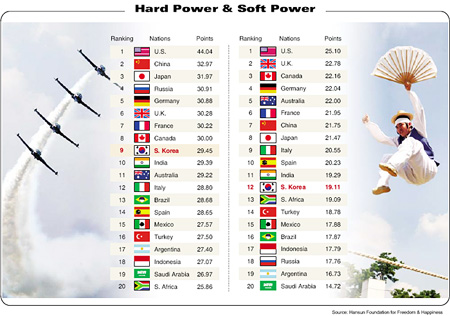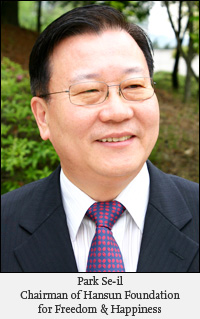
South Korea Ranks Eighth in Defense Power; 11th in Education Category Among G20 Countries
Hansun Foundation for Freedom & Happiness has issued the 2009 Hansun Total National Power (TNP) Index. This is the second in a series of articles to analyze all aspects involving national power, and present tasks and strategies the nation should tackle to sharpen its competitiveness. ― ED.
By Cho Jae-hyon
Staff Reporter

South Korea, after decades of rapid growth in economic, defense and all other fields comprising national power, is at the threshold of joining the ranks of developed nations. However, becoming a truly a developed nation in all aspects is a tall task.
Its total national power (TNP) ― the combination of "hard power" and "soft power" ― stands at 13th among the G20 nations. However, a close look into categories determining its national power reveals that it lags far behind other developed nations in many segments.
Hansun Foundation (Chairman Park Se-il)'s report showed that Korea is stronger in hard power relative to soft power.
Hard power is comprised of seven subcategories ― natural resources, defense, economy, science/technology, education, environment and information.
In comparison, soft power is the combination of governance, political power, diplomacy, culture, social capital and the capability how to cope with economic changes.
In hard power, Korea claimed ninth place and 12th for soft power.
"Korea is a nation with smallest natural resources and its land is also the smallest among the G20 members," said Chung Sung-chul, an honorary researcher of the Science and Technology Police Institute. "It's also surrounded by heavyweight countries. To make Korea a more powerful nation and to overcome this unfavorable geographical environment, it needs differentiated strategies and efforts.
Economic Power
Even 10 years after it breached the $10,000 mark in per capita gross domestic product, the country has not gotten past the $20,000 threshold as yet.
At the same time, its economic size is marking time. After touching the 10th place years ago, it has been sliding and now hovering at around 13th.
What are the factors keeping the country from advancing and catching up with other bigger rivals?
Experts said the country is most shackled by intrinsic economic problems. They pointed out that its growth potential has been restrained by various regulations and inefficient social and economic systems.
"To reinforce the country's economic power, we should boost the private sector's vitality among other things by setting the ground for easier tech innovation and accumulation of human and material resources," said Chung, who was also former president of the Hansun Foundation.
Chung and other experts stressed the need of a better business climate wherein entrepreneurs will be compensated more effectively for their venture into risky businesses under the market principle.
Besides the urgency of the establishment of better systems and deregulation for more active business activities and investments, they said the country must set up mid- to long-term strategies to develop new energy and secure natural resources overseas.
"The government should realize the severity of the low birthrate. We have reached a serious point where the country's growth potential will be threatened by reduction in the population going forward," said Prof. Hwang Sung-don of Hankuk University of Foreign Studies. "In preparation of the aging society, comprehensive countermeasures and various incentives to encourage newly-wed couples have more babies are necessary."
The research team of Hansun Foundation said the prevention of labor loss is essential for the country to boost its production. "We should minimize losses from labor strikes by improving the labor-management relations," Prof. Shin Do-chul of Sookmyung University said. "Corporate investment is losing its steam. To pick up the slack, steps are needed to channel more private sector savings into investments and attract greater investments from foreign nations."
Defense/Science Power
Defense power is also an important ingredient determining a country's hard power. Korea ranked eighth in defense power among the top 20 wealthiest nations, with defense budget accounting for 75 percent weighting in measurement of defense power of each nation and military weapons and other hardware the remainder.
It claimed 13h place in terms of defense budget, with the number of the enlisted reaching about 687,000, the world's fifth largest. The number reserved forces was the second largest, according to the research jointly conducted by Hansun Foundation and Chosun Ilbo.
Korea is being praised as a leader in information and technology sector, with almost all houses hooked up with the Internet. Compared to other rankings, its position in the science/technology category came out at seventh.
The United States ranked the first, followed by Japan, Germany and the United Kingdom.
The research team attributed the relative strength in the category to Korea's active investment in research and development. The high Internet penetration rate was also a major factor contributing to raising the country's rank. Korea ranked 10th in the number of announced thesis.
"There are limitations catching up with advanced nations in sciences. We need to change our strategy. We should put a greater focus on renovating technology with creativeness," Chung of the Science and Technology Police Institute said. He said time is running against Korea as China and other nations are growing fast in the science and tech fields.
Education Power
Korea is well-known for its parents' education zeal for their children. It is the main engine for the nation's education power. Their tireless frenzy for education leads to strong investment in education and high education achievements.
Its overall education power stands 11th among the 20 nations, with education investments ranked at 13th and education output or achievement index at eighth.
Experts said that the outlook for education power is bleak.
"We witnessed a quantitative growth in education at primary and secondary schools. But advancement in higher educational institutes is unlikely," Chung said. "As long as students are going out of the country for higher education, we cannot bring our educational power in line with those of advanced nations."
They said more aggressive investments should be made to renovate education at domestic universities.
"Universities should provide creative education to cultivate elites who can lead economic growth, tech development and social integration," he said.
♤ 이 글은 2009년 9월 18일 THE KOREA TIMES에 실린 글 입니다.



















